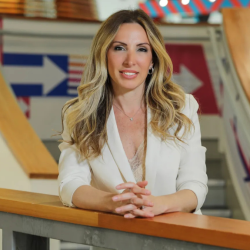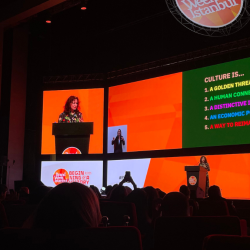If there’s one thing that’s certain in today’s world, it’s uncertainty
Uncertainty about what will replace the things changing before our eyes that we’ve long taken for granted. Uncertainty about what will happen next. And, as a result of both, uncertainty about how best to move forward.
The answer for many is to have a plan and stick to it then, when necessary, tweak it. Just as many, in the looming face of recession, are now starting to do — freezing new hires, for example, and cutting investment.
It’s received wisdom. And the thinking behind it is simple: prioritise only the most business-critical things. Spend only what directly impacts today’s bottom line. Stick to your knitting, reining in where you’re spread too thin. And put on ice side quests — those nice-to-haves, like culture and community — until a better time another day. Because in a crisis, it’s do or die: a matter of survival.
Focus only on how to get through a difficult time, however, and it’s easy to lose sight of what’s important to build an individual or business’s ability to thrive beyond it. Yes, by cutting everything back to the bone, you may stagger through it. But, at what cost?
Cop27, which took place earlier this month (in November 2022) in Egypt, powerfully demonstrated how for many western nations at a time of soaring energy costs, looming recession, and war in Ukraine, efforts to combat climate change are fast becoming a nice-to-have.
Likewise, despite recent work over a number of years by many employers to hire and retain a more diverse workforce, women – who were disproportionately negatively impacted by Covid lockdowns during the worst of the pandemic: women accounted for 70% of jobs lost in the US in 2020 and 2021 — are now more fearful of job loss related to recession, one recent study shows.
Meanwhile people of colour – who took the longest time to regain their employment after the pandemic — and women are more fearful that DEI efforts could be undermined by recession.
According to research published last year, 66% of UK businesses claim to have programmes that support progression and development of talent from underrepresented groups once they’re in their role. Yet 52% of senior business leaders in the UK say their DEI strategy “only pays lip service to supporting talent from underrepresented groups”, the same study shows. Or, to put it politely, their DEI strategy is not the main story, just a side quest.
Make no mistake, for many of us working to further equity and inclusivity in the workplace, DEI is a priority we passionately believe in.
After years in business, then years more spent working in my agency in production, I pushed for DEI — eventually taking on responsibility for it despite having no background in HR. And I did so for personal as well as professional reasons.
I had an interest in culture and identity and a lifelong sense of ‘otherness’
And I had no interest in working in education (check) like other family members, having grown up in suburban Dorset without contacts in the creative industry I wanted to work in, with dreams of doing drama, living in London, and marrying Susan Sarandon.
Then, the more we worked with big tech brands (like Google) and saw what they were doing around DEI, it was obvious we couldn’t ignore it. Knowing we needed to do it to hire and retain the best people, in order to do the best work we can for the clients we serve, I wanted to make sure that our DEI commitment was the best.
By already being part of the agency culture and not parachuted into it, I have been able to do this well.
Today, DEI and sustainability — People and Planet, we call them at Across the Pond — are now ingrained within our annual business goals. They are on a par with having a healthy profit margin and our other core pillars by which we measure the health of our business. This ensures that no matter how bad things get neither will ever be down-graded.
In past recessions, cutting the marketing budget in the face of economic downturn was many businesses’ default response. Yet those businesses that continue their marketing spend to maintain brand presence come out of a recession stronger, numerous research studies show. The lesson? Marketing is a survival factor, despite what some CFOs think.
Now, by the same measure, DEI and sustainability has a critical role to play in creating a work environment people will want to join and stay. Yes, the world and its future feel more uncertain than ever. But the businesses best positioned to deal with whatever comes next will be those that make DEI a central pillar of workplace culture.
Why? Because DEI should be a business’s beating heart.
Featured image: Jopwell / Pexels




























